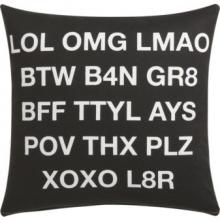It's cute when enormous, faceless corporations try to convince me that they're my best friend in the world. The kind of branding that gets thrown at young people tries to be awfully familiar, like the big guys in capitalism are in on the same jokes as you. But like most corporate attempts at the cutting edge, this kind of marketing tends to look silly after companies beat a certain trend into the ground or overestimate our gullibility. These are my favorite attempts corporations have made at trying to "relate" to me and my money.
Putting everything in lowercase
Unsure if a certain brand is supposed to be hip, young, or fresh? Check the capitalization. If there's none, odds are a marketing exec decided somewhere along the line to make the brand speak to the current generation of youngsters. We text, type, and tweet, you see, and we're far too busy to slide our pinkies to the shift key. An all-lowercase typography gives a brand a sly smugness, a nod to the in-joke of texting culture, an edge that you just can't get with proper syntax. Or so the suits would like to think. CB2--Crate and Barrel's "hipper" offshoot--is super guilty of this. Their layout, with the exception of some generic copy, is rife with lowercase sans-serif. I'm sure you've seen the lack of caps elsewhere. Chicago apartment hunting service domu.com is all over the trend, as are plenty of supposedly hipper startups.
Slapping text speak on things
OMGWTFBBQ, amirite? Sure, plenty of people use digital shorthand for their everyday conversation these days, but that doesn't mean that we want to accessorize with it. These throw cushions from CB2 just seem a little desperate. I'm not even sure what AYS stands for. On a similar note, this is called the PXL8 clock and it was originally priced at $120. Yeesh, CB2.
Charging a lot to look poor
There's a new adage, "it costs a lot to look poor." Clothing companies make sure this stays true. Fashion starts from the bottom up, when designers take inspiration from the streets and then repurpose natural trends for their own very expensive work. The starving artist look is mighty in these days, and so lots of people pay lots of money for name-brand threadbare outfits. But it's not just clothing designers that charge a lot for what should be cheap. I recently discovered that The Container Store sells milk crates. For ten dollars a pop. You know, those things that are free behind the grocery store so long as no one sees you walking away with them? Also known as my own personal modular storage system? Yeah, now you can drop ten bucks to look like you stole a milk crate. Fourteen if you want to opt for the "supreme" variant.
Aggressively marketing everything as "green"
We all grew up on PSAs that instructed us not to waste water and to turn out the lights when we left a room. We've been conditioned to feel guilty when we toss that Coke can in the trash instead of recycling it. Companies know this and use it as the perfect excuse to sell you things you might not buy otherwise. What better marketing tactic is there than to make your customers feel like good people when buying your product? Or more specifically, scare them into thinking that they're bad people unless they buy your product? Green marketing can get awfully passive-aggressive. Just look at the "If You Care" line of paper and kitchen products. They sell recycled aluminum foil and brown coffee filters and all that earth-healthy jazz. You could buy them, maybe. You know. If you care. If saving the world and its inhabitants isn't all that important to you then you could pass these up, I guess. No pressure.
Sneakily guilt-inducing as it may be, at least If You Care seems to have an actual sustainable business model. Plenty of companies slap "green" across anything and everything they can. Even bottled water marketing is starting to convince people that buying tap water in plastic containers is eco-friendly. The containers are made of less plastic than before, see? That heals the earth! Not to mention all the shopping bags, travel mugs, and more that are produced en-masse, using up natural resources in their creation, packaging, and distribution as companies try to sell lots of them to lots of people. Convince them that it's ethically sound and you'll have people buying collections of brightly colored Nalgenes and those silicone-topped ceramic mugs that look just like paper cups but aren't--because using disposable paper would be eco-unfriendly.
